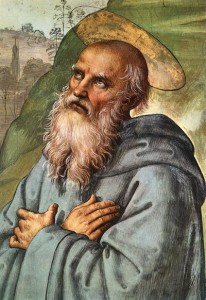“Jesus upbraided them because they did not repent”
[powerpress=”daily-scripture”]
an excerpt from today’s reflection by Don Schwager:
If Jesus were to visit your community today, what would he say? Would he issue a warning like the one he gave to Chorazin and Bethsaida? And how would you respond? Wherever Jesus went he did mighty works to show the people how much God had for them. Chorazin and Bethsaida had been blessed with the visitation of God. They heard the good news and experienced the wonderful works which Jesus did for them. Why was Jesus upset with these communities? The word woe can mean misfortune, calamity, distress, sorrow, sadness, misery, grief, or wretchedness. It is as much an expression of sorrowful pity and grief as it is of dismay over the calamity and destruction which comes as a result of human folly, sin, and ignorance.
Why does Jesus lament and issue a stern warning? The people who heard the gospel here very likely responded with indifference. Jesus upbraids them for doing nothing! Repentance demands change – a change of heart and way of life. God’s word is life-giving and it saves us from destruction – the destruction of heart, mind, and soul as well as body. Jesus’ anger is directed toward sin and everything which hinders us from doing the will of God. In love he calls us to walk in his way of truth and freedom, grace and loving-kindness, justice and holiness. Do you receive his word with faith and obedience or with doubt and indifference?
“Most High and glorious God, enlighten the darkness of our hearts and give us a true faith, a certain hope and a perfect love. Give us a sense of the divine and knowledge of yourself, so that we may do everything in fulfilment of your holy will; through Jesus Christ our Lord.” (Prayer of Francis of Assisi, 1182-1226)
for the full reflection visit : Daily Reading and Meditation
Tags: catholic, catholic podcast, catholic prayer, cathollc spirituality, don schwager, gospel of matthew
This entry was posted on Tuesday, July 12th, 2011 at 12:06 am
You can follow any responses to this entry through the RSS 2.0 feed.
 Prayer to St. Benedict
Prayer to St. Benedict
[powerpress = “devotionals-prayers”]
O glorious St. Benedict, sublime model of all virtues, pure vessel of God’s grace! Behold me, humbly kneeling at thy feet. I implore thy loving heart to pray for me before the throne of God. To thee I have recourse in all the dangers which daily surround me. Shield me against my enemies, inspire me to imitate thee in all things. May thy blessing be with me always, so that I may shun whatever God forbids and avoid the occasions of sin.
Graciously obtain for me from God those favors and graces of which I stand so much in need, in the trials, miseries and afflictions of life. Thy heart was always so full of love, compassion, and mercy toward those who were afflicted or troubled in any way. Thou didst never dismiss without consolation and assistance anyone who had recourse to thee. I therefore invoke thy powerful intercession, in the confident hope that thou wilt hear my prayers and obtain for me the special grace and favor I so earnestly implore (mention it), if it be for the greater glory of God and the welfare of my soul.
Help me, O great St. Benedict, to live and die as a faithful child of God, to be ever submissive to His holy will, and to attain the eternal happiness of heaven. Amen.
For more on the life of St. Benedict visit his Discerning Hearts page
Tags: benedictines, catholic, catholic podcast, catholic prayer, cathollc spirituality, st benedict
This entry was posted on Monday, July 11th, 2011 at 5:51 am
You can follow any responses to this entry through the RSS 2.0 feed.
THE INTERIOR CASTLE
OR
THE MANSIONS
By
St. Teresa of Avila
The Sixth Mansions Chapter 8:
[powerpress]
For the pdf containing the complete text and footnotes click here
1. Our Lord’s presence accompanying the soul. 2. St. Teresa’s experience of this. 3. Confidence and graces resulting from this vision. 4. Its effects . 5. It Produces humility. 6. And prepares the soul for other graces. 7. Consciousness of the presence of the saints. 8. Obligations resulting from this grace. 9. Signs that this favour is genuine. 10. A confessor should be consulted. 11. Our Lord will enlighten our advisers. 12. Cautions about this vision.
.
Translated from the Autograph of St. Teresa of Jesus by
The Benedictines of Stanbrook
Thomas Baker, London [1921]
Dom Michael Barrett, O.S.B.Censor Deputatuus
Nihil Obstat:✠Edward Apostolic Administrator Birmingham, Oscott.
February 24, 1921
Tags: catholic, catholic podcast, catholic prayer, cathollc spirituality, st teresa, st. teresa of avila, Teresa of Avila, the interior castle, THE INTERIOR CASTLE OR THE MANSIONS
This entry was posted on Monday, July 11th, 2011 at 12:58 am
You can follow any responses to this entry through the RSS 2.0 feed.
“Our One Great Act of Fidelity:  Waiting for Christ in the Eucharist” is a wonderful reflection on the many aspects the Eucharist touches our hearts and our lives.  I have read Fr. Ronald Rolheiser for many years in our local diocesans newspaper…what a delight to finally have the opportunity to speak to him, especially about this deeply personal book which  is not only
reflection on the many aspects the Eucharist touches our hearts and our lives.  I have read Fr. Ronald Rolheiser for many years in our local diocesans newspaper…what a delight to finally have the opportunity to speak to him, especially about this deeply personal book which  is not only  offers theological insights, but is a also spiritual and a personal statement of how Fr. Rolheiser understands the Eucharist and why he celebrates it every day.
offers theological insights, but is a also spiritual and a personal statement of how Fr. Rolheiser understands the Eucharist and why he celebrates it every day.
[powerpress]
You can find Fr. Rolheiser’s book here
Tags: catholic, catholic podcast, catholic prayer, cathollc spirituality
This entry was posted on Monday, July 11th, 2011 at 12:19 am
You can follow any responses to this entry through the RSS 2.0 feed.
“He who loves father and mother more than me is not worthy of me”
[powerpress=”daily-scripture”]
an excerpt from today’s reflection by Don Schwager:
When Jesus spoke about division he likely had in mind the prophecy of Micah: a man’s enemies are the men of his own household (Micah 7:6). The love of God compels us to choose who will be first in our lives. To place any relationship or anything else above God is a form of idolatry. Jesus challenges his disciples to examine who they love first and foremost. A true disciple loves God above all else and is willing to forsake all for Jesus Christ. Jesus insists that his disciples give him the loyalty which is only due to God, a loyalty which is higher than spouse or kin. It is possible that family and friends can become our enemies, if the thought of them keeps us from doing what we know God wants us to do.
True love for God compels us to express charity towards our neighbor who is created in the image and likeness of God. Jesus declared that any kindness shown and any help given to the people of Christ will not lose its reward. Jesus never refused to give to anyone in need who asked for his help. As his disciples we are called to be kind and generous as he is. Jesus sets before his disciples the one goal in life that is worth any sacrifice and that goal is the will of God which leads to everlasting life, peace, and joy with God. Does the love of Jesus Christ compel you to put God first in all you do (2 Corinthians 5:14)?
“Lord, no eye has seen, no ear has heard, no heart has conceived the things you have prepared for those who love you. Set us ablaze with the fire of the Holy Spirit, that we may love you in and above all things and so receive the rewards you have promised us through Christ our Lord.” (from A Christian’s Prayer Book)
for the full reflection visit : Daily Reading and Meditation
Tags: catholic, catholic podcast, catholic prayer, cathollc spirituality, don schwager, gospel of matthew
This entry was posted on Monday, July 11th, 2011 at 12:01 am
You can follow any responses to this entry through the RSS 2.0 feed.
THE INTERIOR CASTLE
OR
THE MANSIONS
By
St. Teresa of Avila
The Sixth Mansions Chapter 9:
[powerpress]
For the pdf containing the complete text and footnotes click here
1. The jewel in the locket. 2. The simile explained. 3. The apparition explained. 4. Awe produced by this vision. 5. False and genuine visions. 6. Illusive visions. 7. Effects of a genuine vision. 8. Conviction left by a genuine vision. 9. Its effects upon the after conduct. 10. A confessor should be consulted. 11. How to treat visions. 12. Effects of seeing the face of Christ. 13. Reasons why visions are not to be sought. 14. The second reason. 15. Third reason. 16. Fourth reason. 17. Fifth reason. 18. Sixth reason. 19. Additional reasons. 20. The virtues more meritorious than consolations. 21.Fervent souls desire to serve God for Himself alone.
.
Translated from the Autograph of St. Teresa of Jesus by
The Benedictines of Stanbrook
Thomas Baker, London [1921]
Dom Michael Barrett, O.S.B.Censor Deputatuus
Nihil Obstat:✠Edward Apostolic Administrator Birmingham, Oscott.
February 24, 1921
Tags: catholic, catholic podcast, catholic prayer, cathollc spirituality, st. teresa of avila, Teresa of Avila, the interior castle, THE INTERIOR CASTLE OR THE MANSIONS
This entry was posted on Sunday, July 10th, 2011 at 3:28 pm
You can follow any responses to this entry through the RSS 2.0 feed.
In Paradisum
Latin:
In Paradisum deducant Angeli in tuo
adventu suscipiant te Martyres
et perducant te in civitatem sanctam Jerusalem
English:
May the angels receive them in Paradise,
at thy coming may the martyrs receive thee and bring thee into the holy city Jerusalem
Tags: Angeli, catholic, catholic podcast, catholic prayer, cathollc spirituality, faure, Gabriel Faure
This entry was posted on Saturday, July 9th, 2011 at 9:45 pm
You can follow any responses to this entry through the RSS 2.0 feed.
THE INTERIOR CASTLE
OR
THE MANSIONS
By
St. Teresa of Avila
The Sixth Mansions Chapter 10:
[powerpress]
For the pdf containing the complete text and footnotes click here
1. Reasons for speaking of these supernatural favours. 2. An intellectual vision. 3. God compared to a palace in which His creatures dwell. 4. Forgive as we are forgiven. 5. The vision shows God to be Truth itself. 6. We should imitate God by truthfulness. 7. Why God reveals these truths.
Translated from the Autograph of St. Teresa of Jesus by
The Benedictines of Stanbrook
Thomas Baker, London [1921]
Dom Michael Barrett, O.S.B.Censor Deputatuus
Nihil Obstat:✠Edward Apostolic Administrator Birmingham, Oscott.
February 24, 1921
Tags: catholic, catholic podcast, catholic prayer, cathollc spirituality, st teresa, st. teresa of avila, Teresa of Avila, the interior castle, THE INTERIOR CASTLE OR THE MANSIONS
This entry was posted on Saturday, July 9th, 2011 at 4:40 pm
You can follow any responses to this entry through the RSS 2.0 feed.
“Fear him who can destroy both soul and body in hell?”
[powerpress=”daily-scripture”]
an excerpt from today’s reflection by Don Schwager:
What does fear have to do with the kingdom of God? Fear is a powerful force. It can lead us to panic and flight or it can spur us to faith and action. The fear of God is the antidote to the fear of losing one’s life. I sought the Lord, and he answered me, and delivered me from all my fears.O fear the Lord, you his saints, for those who fear him have no want! Come, O sons, listen to me, I will teach you the fear of the Lord. (Psalm 34:4,9,11) What is godly fear? It is reverence for the One who made us in love and who sustains us in mercy and kindness. The greatest injury or loss which we can experience is not physical but spiritual – the loss of one’s soul to the power of hell. A healthy fear of God leads to spiritual maturity, wisdom and right judgment and it frees us from the tyranny of sinful pride, cowardice – especially in the face of evil, and spiritual deception. Do you trust in God’s grace and mercy and submit to his word?
When Jesus proclaimed the kingdom of God he met opposition and hostility. He tells his disciples that they must expect the same treatment if they are to live and to proclaim the reign of God. There is both a warning and a privilege in his statement. Just as Jesus had to carry his cross, so the disciples must carry their cross and not try to evade it. To suffer for the faith is to share in the work of Christ. As one hymn states: Lift high the Cross of Christ! Tread where his feet have trod. The Holy Spirit gives us power and grace to live as disciples of Jesus Christ. Do you trust in God’s grace to carry your cross for Jesus’ sake?
“Lord Jesus, it is my joy and privilege to be your disciple. Give me strength and courage to bear any hardship and suffering which may come my way in your service. May I witness to others the joy of the gospel.”
for the full reflection visit : Daily Reading and Meditation
Tags: catholic, catholic podcast, catholic prayer, cathollc spirituality, don schwager, gospel of matthew
This entry was posted on Saturday, July 9th, 2011 at 6:36 am
You can follow any responses to this entry through the RSS 2.0 feed.
THE INTERIOR CASTLE
OR
THE MANSIONS
By
St. Teresa of Avila
The Sixth Mansions Chapter 11:
[powerpress]
For the pdf containing the complete text and footnotes click here
1. Favours increase the soul’s desire for God. 2. The dart of love. 3. Spiritual sufferings produced. 4. Its physical effects. S. Torture of the desire for God. 6. These sufferings are a purgatory. 7. The torments of hell. 8. St. Teresa’s painful desire after God. 9. This suffering irresistible. 10. Effects of the dart of love. 11. Two spiritual dangers to life. 12. Courage needed here and given by our Lord.
Translated from the Autograph of St. Teresa of Jesus by
The Benedictines of Stanbrook
Thomas Baker, London [1921]
Dom Michael Barrett, O.S.B.Censor Deputatuus
Nihil Obstat:✠Edward Apostolic Administrator Birmingham, Oscott.
February 24, 1921
Tags: catholic, catholic podcast, catholic prayer, cathollc spirituality, S. Torture, Spiritual sufferings, st. teresa of avila, Teresa of Avila, THE INTERIOR CASTLE OR THE MANSIONS
This entry was posted on Friday, July 8th, 2011 at 12:23 pm
You can follow any responses to this entry through the RSS 2.0 feed.
“I send you out as sheep in the midst of wolves”
[powerpress=”daily-scripture”]
an excerpt from today’s reflection by Don Schwager:
What does Jesus mean when he says his disciples must be sheep in the midst of wolves? The prophet Isaiah foretold a time when wolves and lambs will dwell in peace (Isaiah 11:6 and 65:25). This certainly refers to the second coming of Christ when all will be united under the Lordship of Jesus after he has put down his enemies and established the reign of God over the heavens and the earth. In the meantime, the disciples must expect opposition and persecution from those who oppose the gospel. Jesus never hesitated to tell his disciples what they might expect if they followed him. Here Jesus says to his disciples: This is my task for you at its grimmest and worst; do you accept it? This is not the world’s way of offering a job. After the defeat at Dunkirk, Churchill offered his country blood, toil, sweat, and tears. This is not the message we prefer to hear when the Lord Jesus commissions us in his service. Nonetheless, our privilege is to follow in the footsteps of the Master who laid down his life for us. Are you willing to accept hardship and suffering in following after the Lord?
“Lord Jesus, help me to patiently and joyfully accept the hardships, adversities, and persecution which come my way in serving you. Strengthen my faith and give me courage that I may not shrink back from doing your willâ€.
for the full reflection visit : Daily Reading and Meditation
Tags: catholic, catholic podcast, catholic prayer, cathollc spirituality, don schwager, gospel of matthew
This entry was posted on Friday, July 8th, 2011 at 12:01 am
You can follow any responses to this entry through the RSS 2.0 feed.
THE INTERIOR CASTLE
OR
THE MANSIONS
By
St. Teresa of Avila
The Seventh Mansions Chapter 1:
[powerpress]
For the pdf containing the complete text and footnotes click here
1. Sublime mysteries of these mansions. 2. St. Teresa abashed at treating such subjects. 3. Our Lord introduces His bride into His presence chamber. 4. Darkness of a soul in mortal sin. 5. Intercession for sinners. 6. The soul an interior world. 7. The spiritual nuptials. 8. Former favours differ from spiritual nuptials. 9. The Blessed Trinity revealed to the soul. 10. Permanence of Its presence in the soul. 11. The effects. 12. This presence is not always equally realized. 13. It is beyond the soul’s control. 14. The center of the soul remains calm. 15. The soul and the spirit distinct though united. 16. The soul and its faculties not identical.
Translated from the Autograph of St. Teresa of Jesus by
The Benedictines of Stanbrook
Thomas Baker, London [1921]
Dom Michael Barrett, O.S.B.Censor Deputatuus
Nihil Obstat:✠Edward Apostolic Administrator Birmingham, Oscott.
February 24, 1921
Tags: catholic, catholic podcast, catholic prayer, cathollc spirituality, st teresa, st. teresa of avila, Teresa of Avila, The Seventh Mansions
This entry was posted on Thursday, July 7th, 2011 at 9:45 pm
You can follow any responses to this entry through the RSS 2.0 feed.
 Episode 9-Listening For Truth– The supernatural virtues provide for us the gifts to walk and respond to moral truths.  We need to practice the virtues to receive the wisdom of God and to be more deliberate in the love of the good.  The theological, contemplative language is foreign to many, unlike the political language in which the culture swims, and that can affect how we respond to moral questions.  What can we do to listen and respond to Truth?
Episode 9-Listening For Truth– The supernatural virtues provide for us the gifts to walk and respond to moral truths.  We need to practice the virtues to receive the wisdom of God and to be more deliberate in the love of the good.  The theological, contemplative language is foreign to many, unlike the political language in which the culture swims, and that can affect how we respond to moral questions.  What can we do to listen and respond to Truth?
[powerpress]
Deacon James Keating, PhD, the director of Theological Formation for the Institute for Priestly Formation, located at Creighton University, in Omaha, is making available to â€Discerning Hearts†and all who listen, his series of programs entitled “Listening For Truthâ€.
Listening for Truth leads men and women in a search for a fuller experience of God that begins in prayer, grows in the rediscovery of our spiritual being, and grounds itself in the truth of Jesus Christ. A presentation of the Christian life as an engagement of the whole person — body, mind, and soul — in the challenge of daily living.
For more information on the “Institute of Priestly Formation†and for other material available by Deacon Keating, just click here
Don’t forget to pickup a copy of “Communion with Christ†, it is one of the best audio sets on prayer…ever!
Check out Deacon Keating’s “Discerning Heart†page
Tags: catholic, catholic podcast, catholic prayer, cathollc spirituality, creighton university, Deacon James Keating, Deacon Keating, discernment of spirits, institute for priestly formation, political language, prayer, theological formation
This entry was posted on Thursday, July 7th, 2011 at 7:10 pm
You can follow any responses to this entry through the RSS 2.0 feed.
“You received without paying, give without paying”
[powerpress=”daily-scripture”]
an excerpt from today’s reflection by Don Schwager:
Jesus said to his disciples: Freely you have received, freely give. What they have received from Jesus they must now pass on to others without expecting a favor in return, whether it be in form of a gift or payment. They must show by their attitude that their first interest is in serving God, not receiving material gain. They must serve without guile, full of charity and peace, and simplicity. They must give their full attention to the proclamation of God’s kingdom and not be diverted by other lesser things. They must travel light – only take what was essential and leave behind whatever would distract them – in order to concentrate on the task of speaking the word of the God. They must do their work, not for what they can get out of it, but for what they can give freely to others, without expecting special privileges or reward. “Poverty of spirit†frees us from greed and preoccupation with possessions and makes ample room for God’s provision. The Lord wants his disciples to be dependent on him and not on themselves.
Secondly, Jesus said: the worker deserves his sustenance. Here we see a double-truth: the worker of God must not be overly-concerned with material things, but the people of God must never fail in their duty to give the worker of God what he or she needs to sustain themselves in the Lord’s service. Do you pray for the work of the gospel and do you support it with your material and financial resources? Jesus ends his instructions with a warning: If people reject God’s invitation and refuse his word, then they bring judgment and condemnation on themselves. When God gives us his word there comes with it the great responsibility to respond. Indifference will not do. We are either for or against God in how we respond to his word. God gives us his word that we may have life – abundant life – in him. He wills to work in and through each of us for his glory. God shares his word with us and he commissions us to speak it boldly and simply to others. Do you witness the truth and joy of the gospel by word and example to those around you?
“Lord Jesus, may the joy and truth of the gospel transform my life that I may witness it to those around me. Grant that I may spread your truth and your light wherever I go.â€
for the full reflection visit : Daily Reading and Meditation
Tags: catholic, catholic podcast, catholic prayer, cathollc spirituality, don schwager, gospel of matthew
This entry was posted on Thursday, July 7th, 2011 at 5:46 am
You can follow any responses to this entry through the RSS 2.0 feed.
THE INTERIOR CASTLE
OR
THE MANSIONS
By
St. Teresa of Avila
The Seventh Mansions Chapter 2:
[powerpress]
For the pdf containing the complete text and footnotes click here
1. The spiritual nuptials introduced by an imaginary vision. 2. Spiritual betrothal and marriage differ. 3. Spiritual marriage lasting. 4. Not so spiritual betrothal. 5. Spiritual marriage permanent. 6. St. Paul and spiritual marriage. 7. The soul’s joy in union. 8. Its conviction of God’s indwelling. 9. Its peace. 10. Christ’s prayer for the divine union of the soul. 11. Its fulfilment. 12. Unalterable peace of the soul in the seventh Mansion. 13. Unless it offends God. 14. Struggles outside the seventh Mansion. 15. Comparisons explaining this.
Translated from the Autograph of St. Teresa of Jesus by
The Benedictines of Stanbrook
Thomas Baker, London [1921]
Dom Michael Barrett, O.S.B.Censor Deputatuus
Nihil Obstat:✠Edward Apostolic Administrator Birmingham, Oscott.
February 24, 1921
Tags: catholic, catholic podcast, catholic prayer, cathollc spirituality, Spiritual marriage, st. teresa of avila, Teresa of Avila
This entry was posted on Wednesday, July 6th, 2011 at 10:28 am
You can follow any responses to this entry through the RSS 2.0 feed.




